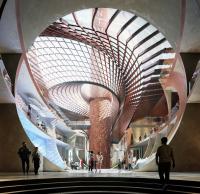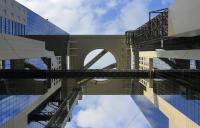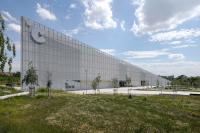Pharo
Milan, 意大利
Pharo, a new office building designed by Park Associati, was built on a lot that, given its crucial position along the city centre access roads and its proximity to the Citylife and Portello neighbourhoods, has great strategic potential for urban development. Thanks to these elements, this is a place of great interest for the evolution of Milan's urban morphology.
This project of urban mending was developed around the key concept of permeability, which was the leitmotif behind the volumetric decomposition of the typical urban block, in particular of the continuity of the front in Via Gattamelata. On the corner with Via Teodorico, the building is recessed from the pavement’s profile, giving life to a completely open area accessible by the public, a new reception square generated by the building’s elegant planimetric play. Barycentric with respect to the building's entire composition, the hall is a passageway leading to the square connecting both Piazzale Türr and Via Teodorico – an expression of the site’s high permeability.
The complex is a dynamic succession of volumes sharing a single organic language, characterised on the façade by the rhythmic sequence of the jutting elements and the different material qualities of the surfaces.
The highest volume is a 67-metre-high tower, while on the opposite side of the lot the lowest 8-metre-high structure is designed to be an auditorium. Both volumes are lit at night, the tower to resemble a lantern, a luminescent lighthouse that adds a new landmark to the cityscape.
The building is LEED Platinum certified, so it is extremely energy-efficient. Energy saving was also one of the main themes of the study of the façades’ design language, which alternates transparent glazed surfaces and solid surfaces in anodised aluminium sheet or perforated sheet. Within this complex of dynamic volumes, the façade sections covered in sheet metal serve the double purpose of limiting irradiation – an inevitable problem common to all-glass façades – and guaranteeing some privacy.
In line with sustainability-related issues, the use of materials on the façade was kept to a minimum. The depth of the jutting sheet metal shielding elements increases as they climb from the lower floors to the upper floors, where their function of sun shading is needed most. Such size variations contribute to define a fluid and dynamic perception of the entire building.















